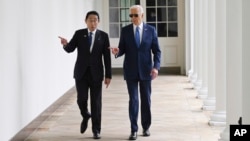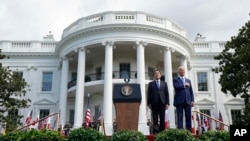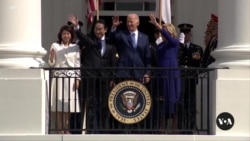From cherry trees to collective deterrence, the United States and Japan celebrated their decadeslong alliance Wednesday, as President Joe Biden hosted Prime Minister Fumio Kishida at the White House for an official visit and state dinner.
The leaders announced new initiatives on technology and defense, including an upgrade of allied command-and-control arrangements for American and Japanese forces, new investments and partnerships on space, artificial intelligence, quantum technology, semiconductors and clean energy.
But the strongest focus was on military deterrence to enhance maritime cooperation in the South China Sea, as well as air defense.
"For the first time, Japan and the United States and Australia will create a network system of air missile and defense architecture,” Biden said.
The leaders signed a deal for Japan to provide a rover to support astronauts working on the moon. The U.S. will allocate two astronaut flight opportunities to the lunar surface for Japan on NASA’s future Artemis missions.
One of those Japanese astronauts, Biden said, “will become the first non-American ever to land on the moon.”
Biden called Kishida a “visionary and courageous leader” for the steps he has taken to support Ukraine in its fight against Russia’s invasion. He commended Kishida’s push to bolster Japan’s defense capabilities.
Tokyo has increased defense spending and intensified joint military exercises with the United States and other regional allies, turning it into a key player in what the Biden administration calls its “lattice-like strategic architecture” to bolster deterrence against adversaries.
Kishida, speaking through an interpreter, reaffirmed that his government was ready to become a “global partner” in tackling the challenges of the region and around the world.
However, Biden and Kishida must navigate a key irritant — Nippon Steel plans to acquire Pittsburgh-based U.S. Steel. Biden has indicated his opposition to the deal, a thorny issue ahead of the U.S. presidential election in November.
At their joint press conference, both leaders sought to downplay the issue.
Biden reaffirmed his “commitment” to American workers as well as to the alliance. Kishida announced new Japanese investments in the U.S., including $8 billion by Toyota to increase battery production in North Carolina.
New U.S. private investments in Japan were also announced, including $2.9 billion by Microsoft on artificial intelligence and cloud computing, and $15 billion by Amazon Web Services to expand cloud infrastructure.
Trilateral summit
The leaders will take part in a trilateral summit on Thursday with President Ferdinand Marcos Jr. of the Philippines, another key regional ally. The U.S.-Japan-Philippines trilateral meeting will focus on freedom of navigation in the South China Sea.
“The idea of switching to a multilateral, lattice-like strategic architecture is then to flip the script and isolate China,” a senior administration official said during a briefing to reporters Tuesday.
“When you have, like we did this week, the United States, Japan, Australia and the Philippines doing an exercise together, when you have the trilat on Thursday, the country that’s isolated is China, not the Philippines.”
Last year, Biden hosted a similar trilateral meeting with Japan and South Korea to deal with the threat from North Korea. Kishida had taken a “bold” step, Biden said Wednesday, to allow the two former enemies “to heal all wounds.”
Such arrangements have been supported by the Japanese people, who feel their security is increasingly threatened by China, North Korea and Russia, said former U.S. Ambassador to Japan Tom Schieffer.
"The war in Ukraine has precipitated a lot of this, because it brought back the memory that aggression is not something that's out of the question in the 21st century,” he told VOA.
Wednesday’s meeting was the 12th in-person engagement Biden has had with Kishida since taking office and was a major milestone for the two countries, once bitter enemies during World War II. It marked a historical shift in defense ties from “alliance protection to alliance projection,” the official said.
“When it’s either the Quad or either one of the trilats, or whether it’s a military exercise with the Philippines, the constant in all this by our side is Japan. That did not exist five years ago, 10 years ago, 15 years ago, 20 years ago,” the official said. “This is the new norm.”
The Quad refers to the quadrilateral strategic security dialogue among Australia, India, Japan and the United States.
Of the many security initiatives announced Wednesday, the most significant was the restructuring of the alliance in Japan, including the revamping of the command-and-control structures that would allow greater interoperability between American and Japanese forces, said John Hemmings, senior associate director at the Pacific Forum.
In addition to a more capable Self-Defense Forces, the restructuring will address Japan’s coast guard and other agencies that may be civilian in nature but will be crucial to naval deterrence, Hemmings told VOA.
Those agencies are on the front lines of maritime spaces, where “Chinese ships, Chinese fishing militia and Chinese navy forces are constantly pushing on its neighbor’s sovereign territory.”
Regional deterrence
Biden and Kishida discussed Japan’s potential involvement under “Pillar II” of AUKUS, a trilateral security partnership formed in 2021 among the U.S., Australia and the United Kingdom to strengthen deterrence against China.
The focus is on advanced capabilities and sharing technologies, including quantum computing, undersea capabilities, hypersonic weapons, artificial intelligence and cyber technology. It takes the group’s effort to push back against China beyond its first pillar — delivery of nuclear-powered attack submarines to Australia.
White House national security adviser Jake Sullivan on Tuesday confirmed plans for trilateral joint naval patrols by the U.S., Japan and the Philippines in the South China Sea, another move likely to trigger a strong reaction from Beijing.
China said it opposes “cobbling together exclusive groupings and stoking bloc confrontation in the region.”
"Japan needs to earnestly draw lessons from history and stay prudent on military and security issues,” Chinese Foreign Ministry spokesperson Mao Ning said during her briefing Tuesday.
Kishida’s visit caps state visits by leaders of the Quad, hosted by Biden since taking office. The only other state visit hosted by Biden was for President Emmanuel Macron of France - underscoring Biden’s focus on Indo-Pacific security partnerships.
Kishida also will participate in a cherry tree-planting ceremony at Washington’s Tidal Basin, where thousands of cherry trees gifted by the Japanese government in 1912 delight tourists with their blossoms each spring. Tokyo has offered to replace the hundreds of trees that have had to be removed because of repairs to the Tidal Basin.
VOA’s Young Gyo Kim contributed to this report.








